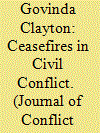| Srl | Item |
| 1 |
ID:
193110


|
|
|
|
|
| Summary/Abstract |
Ceasefires are arrangements through which conflict parties commit to stop fighting. They are a common part of intra-state conflict. Existing research on intra-state ceasefires is largely limited to case studies and guidance notes for the policy and practice community. What has to date been lacking is a complementing body of comparative quantitative analysis to identify broader ceasefire trends and test the wider applicability of theory. Recent advancements in ceasefire data offer new opportunities to broaden the research agenda on ceasefires. This special section sets out the current state of the art in ceasefire research and provides the intellectual foundations to advance a new sub-field of quantitative ceasefire research. We discuss the conceptual challenges facing the study of ceasefires, offer a brief overview of ceasefire research focusing on the functions, timing, and sustainability of arrangements, and discuss the collective contributions of the articles included within this special section, and the implications for research and practice.
|
|
|
|
|
|
|
|
|
|
|
|
|
|
|
|
| 2 |
ID:
193116


|
|
|
|
|
| Summary/Abstract |
This article introduces the Civil Conflict CeaseFire (CF) dataset. The CF data covers all ceasefires in civil conflict between 1989 and 2020, including multilateral, bilateral and unilateral arrangements, ranging from verbal arrangements to detailed written agreements. In total, the CF data includes 2202 ceasefires across 66 countries and 109 civil conflicts. The data feature information on the actors involved in the ceasefire, and the class, purpose, coverage, and end date of the ceasefire. The CF data provide an empirical basis to assess the conditions that give rise to ceasefires, how ceasefires affect the dynamics of conflict, and the role of a ceasefire in the peace process. This article presents the rationale underlying the data collection, the coding rules and procedures, and how this data can be used for analysis.
|
|
|
|
|
|
|
|
|
|
|
|
|
|
|
|